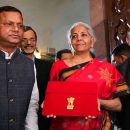COVID-19 reinfection likely if antibodies reduce in 5 months

Last updated on February 20th, 2023 at 01:06 pm
Amid the ongoing efforts to combat the novel Coronavirus pandemic in the country, the Indian Council of Medical Research (ICMR) on Tuesday said that a person can get reinfected with COVID-19 if antibodies against the virus reduce in their body within five months after recovering from the disease.
In line with this development, ICMR Director-General Dr Balram Bhargava urged the public to continue wearing face masks and comply with all precautionary measures to contain the spread of the virus infection.
“That is why it is important to wear masks and take precautions even if one was infected earlier,” he said, as quoted by the PTI report.
Dr Bhargava also spoke about the 100-day criteria of the ICMR to identify a reinfection case, adding that approximately 24 such cases of reinfection have been recorded across the world as of now. There have been a few cases of COVID-19 reinfection reported in India as well including two in Mumbai and one in Ahmedabad.
“The criteria to identify a reinfection case is somewhere between 90 and 100 days. WHO has not yet decided the number of days. However, we’re taking a cut-off of about 100 days,” the ICMR DG added.
As per a recent study published in the Lancet Infectious Diseases journal, evidence has been found that COVID-19 patients may develop more severe symptoms if reinfected with the disease. While the study is based on the observations derived from the case of a 25-year old American man who was hospitalised with oxygen support during his second infection, it also points out that the one case “does not provide generalisability” of the research.
Dr Bhargava further explained about the solidarity trial implemented by the World Health Organisation (WHO) aimed at finding an effective treatment for COVID-19 in which India is also a participant.
As per the WHO website, “solidarity is one of the largest international randomized trials for COVID-19 treatments” in which around 12 000 patients in 500 hospital sites in over 30 countries across the world are participating. Under the trial, effects of various drugs are being evaluated on the basis of three key outcomes in COVID-19 patients: mortality, need for assisted ventilation and duration of hospital stay.
“WHO solidarity trial is a 30-country trial in which India has been a participant and interim results of this have been put on the website, which has not yet been peer-reviewed. However, we find that these drugs are not performing as good as it was expected,” Dr Bhargava added.
In addition, the Ministry of Health and Family Welfare noted that India has achieved the largest number of COVID-19 recoveries in the world as well as second-highest number of virus tests conducted in any country.
Meanwhile, Prime Minister Narendra Modi on Tuesday addressed the nation, ahead of the beginning of the festive season. In his address, he urged that public to continue following the safety norms as the Coronavirus disease is still active and present in India.
“Till the time we get a vaccine shot, we absolutely cannot be complacent about the pandemic,” PM Modi said. On Monday, India recorded less than 50,000 new infections for the first time in around three months, taking the total caseload to over 7.6 million people in the country.
Read More: Parties continue to field tainted candidates in Bihar



